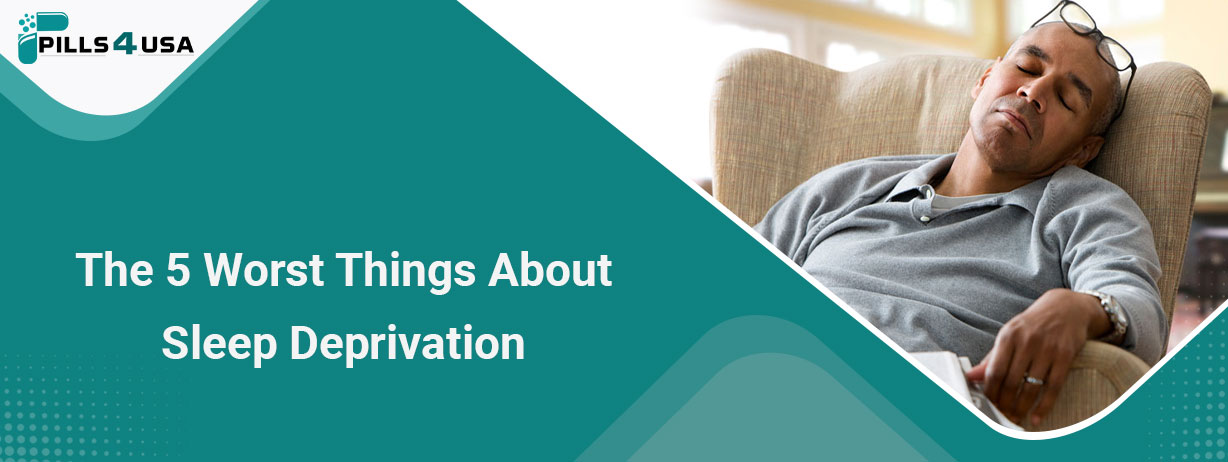Overview
It is no secret that if you have ever spent the night tossing and turning, you will feel tired, cranky, and out of sorts the following morning. Getting much less sleep than the recommended 7 to 9 hours does less than make you experience groggy.
Sleep deprivation can have long-term effects. Some people even consider insomnia a sleep disorder. Get a better night’s sleep with Waklert 150 mg and Artvigil 150 Pills.
Your mental abilities get drained and your physical health gets put at risk. From weight gain to a weakened immune machine, poor sleep has been related to several health issues. Read to know the 5 worst things about sleep deprivation.
Sleep Deprivation Causes
Consistently now not getting sufficient sleep or getting negative great sleep reasons for sleep deprivation. When you do not get enough sleep every night, it could affect your entire body. An underlying sleep disorder could also cause this.
It is as essential for your frame to sleep as it’s miles to breathe and devour. Sleep helps your body heal itself and restore its chemical balance.
The brain makes new connections and helps you remember stuff. Finally, individuals are forced to rely on drugs like Zopisign 10 to relax their minds and fall asleep rapidly.
You will no longer be able to feature commonly without sufficient sleep. You can also lose a lot of quality of life from it.

Symptoms of sleep deprivation encompass:
- Getting too sleepy
- Yawning all the time
- Feeling irritable
- Fatigue during the day
The 5 Worst Things About Sleep Deprivation
1) The Nervous System
Your body’s central nervous system is the primary route for information to be transmitted. The body needs sleep to function properly, but chronic insomnia makes it hard to do that.
Sleep bureaucracy pathways between nerve cells (neurons) in your mind that help you remember new stuff. Depriving yourself of sleep leaves your brain exhausted, so you can’t produce as good art.
Also, you might have trouble concentrating or learning new stuff. It can also slow down your body’s signals, making you less coordinated and more likely to get hurt.
Your mental ability and emotional state are also negatively affected by sleep deprivation. Impatience or mood swings are possible. Creativity and decision-making can also be compromised.
It is feasible to have hallucinations when you have been dozing too little for a long time. Sleep deprivation can also trigger mania in humans with bipolar temper disorder. There are also psychological risks:
- Impulsive behavior
- Feeling anxious
- Depression
- Paranoia
- Feeling suicidal
You might also end up micro-sleeping during the day. These episodes cause you to fall asleep for a few to several seconds without knowing it.
Getting a microsleep while driving is dangerous since you can not control it. Having a microsleep episode while operating heavy machinery at work can also make you more likely to get injured.
2) The Frame’s Immune System
During sleep, your immune machine produces antibodies and cytokines that fight infections. To cast off microorganisms and viruses, it uses those materials.
In addition to helping you sleep, a few cytokines raise your immune gadget’s ability to combat sickness.
When you do not get sufficient sleep, your immune device no longer builds up. When you do not get enough sleep, your body will not be able to fight off invaders, and recovering from illness might be harder. You are more likely to develop chronic conditions if you do not get enough sleep.
3) The Respiration Device
There is a connection between sleep and the breathing machine. During the night, you can have a respiratory disease referred to as obstructive sleep apnea (OSA).
Sleep deprivation can make you more susceptible to respiratory infections like colds and flu since you wake up throughout the night. It can also make current respiratory illnesses worse, like persistent lung disorders.
4) The Digestive Gadget
Lack of sleep is another risk factor for becoming overweight and obese, along with eating too much and not exercising. Feelings of starvation and fullness are controlled with the aid of the hormones, leptin, and ghrelin.
Your brain gets a signal from leptin when you have eaten enough. When you no longer get enough sleep, your brain reduces leptin and will increase appetite-stimulating ghrelin. It could explain why people snack at night or overeat at night.
Exercise can be hard when you are tired from not getting enough sleep. Reducing bodily interest could make you gain weight due to the fact you are not burning sufficient energy.
You launch much less insulin while you no longer get enough sleep. You can use insulin to lower your blood sugar (glucose). Sleep deprivation also lowers glucose tolerance and increases insulin resistance. Obesity and diabetes mellitus can result from these disruptions.
5) The Cardiovascular System
In addition, to affecting your blood sugar, blood strain, and irritation stages, sleep impacts your coronary heart and blood vessels.
The blood vessels and coronary heart need it to heal and repair. Cardiovascular disease is more likely in people who do not sleep enough. There is a hyperlink between insomnia and coronary heart attacks and strokes.
Final Words
Make sure you get enough sleep to prevent sleep deprivation. Talk to your medical doctor if you are having a problem snoozing at night time or feel worn out during the day. Your sleep schedule could be hindered by underlying health conditions.



